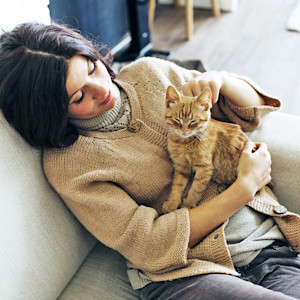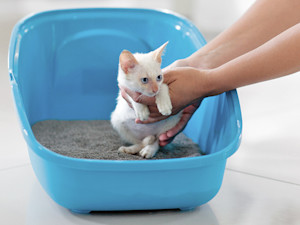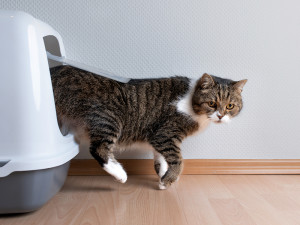How Long Can a Kitten Go Without Pooping?
Our experts explain.

Share Article
In This Article:
How Long Can a Kitten Safely Go Without Pooping?opens in a new tab Kitten Constipation Warning Signsopens in a new tab 4 Reasons Why Your Kitten Isn’t Poopingopens in a new tab What To Do If Your Kitten Can’t Poop opens in a new tab When to See a Vet for Kitten Constipationopens in a new tab Home Remedies for Kitten Constipationopens in a new tab Final Thoughts: How Long Kittens Can Go Without Poopingopens in a new tab Frequently Asked Questionsopens in a new tab
Pooping is a really important topic when it comes to kittensopens in a new tab. Up until around four weeks of age, kittens can’t poop on their own. The mother cat has to stimulate the anal region with her tongue to get her kittens to poop. If she doesn’t do a good job of that or if the kittens are orphaned, you, as the pet parent, have to use a soft, damp cotton cloth to stimulate your kitten to poop.
A kitten should have a bowel movement at least once daily, maybe more. A good time to stimulate your kitten to poop is right after a meal. If your kitten doesn’t respond for more than 24 hours, you must be on the lookout for kitten constipation. This guide will tell you the symptoms to watch for, what actions you can take, and when to go to the vet. Ignoring constipation can lead to serious consequences.

littleKin™ is Kinship’s home just for puppy and kitten parents. Bop over to check out expert advice, new pet tools, and special deals—all curated for your newest family member.
opens in a new tabMain takeaways
A kitten should have a bowel movement every 24 to 36 hours.
Kittens can get very ill if they do not poop often enough.
To help your kitten poop, increase water, add fiber, stimulate the anus, and decrease stress.
If your kitten hasn’t pooped in 48 hours, see your vet right away.
How long can a kitten safely go without pooping?
Very young kittens tend to defecate at least once daily, although it is not uncommon to poop after every meal. They definitely should poop once every 24 to 36 hours. Older kittens or cats who have transitioned to solid food tend only to poop once or twice daily. If it’s been longer than that, it’s time to be concerned. Kittens, in particular, can quickly become ill if they do not poop often enough. Not only can it be uncomfortable, but serious health conditions, such as obstructionopens in a new tab or dehydration, can occur.
Kitten constipation warning signs
The most obvious sign of kitten constipation is the lack of production of stool. However, there can be other preceding signs that you must be aware of. These include:
Straining in the litter box without producing anything
Pooping small, dry, or hard stools can be a precursor to constipation.
Lethargy
Vomiting
Crying more often than usual
A bloated belly
Decreased or no appetite
If your kitten is showing these warning signs, it is time to call the vet.
4 reasons why your kitten isn’t pooping
There are several reasons why your kitten or cat may become constipated, but the following are the most common:
New home, routine, or environment
Kittens and grown cats do not respond well to change. If their environment changes, a new pet is added to the household, strangers visit, or their litter box is changed, they can become very stressed. Stress can alter the motility of the gastrointestinal tract, leading to constipation.
Dehydration
Kittens are so small that they can quickly become dehydrated. When they go through the weaning process, they may suddenly not consume enough water. Eating dry food can cause dehydration because it has very little moisture in it. If kittens are not offered a fresh bowl of water with access to it all the time, they can become dehydrated. Water is essential for digestion, so if a kitten is dehydrated, stools will be harder and more difficult to pass, causing constipation.opens in a new tab
You can check for dehydration by feeling a kitten’s gums. They should be moist, not tacky or dry. Dehydration will also cause sunken eyes. Decreased skin turgor, which means if their skin is pinched, it doesn’t bounce right back, is another sign of dehydration.
Not enough fiber
If your kitten is less than four weeks of age, orphaned, and not being fed a proper vet-recommended formula, they may not be getting enough fiber. Likewise, if your kitten has been weaned and is not eating a well-balanced, high-quality foodopens in a new tab, they may not have enough fiber. Fiber is essential for proper digestion because it provides bulk to help push stool through the intestines and draws water into the colon. If a kitten’s diet is low on fiber, constipation may occur.
Medical conditions
Constipation can result from medical conditions or even medications. Examples include congenital problems, intestinal blockages, and parasites. Megacolon, a dilation of the colon that decreases motility, can be congenital, a nerve or muscular issue, or acquired from repeated bouts of constipation. It will prevent bowel movements. A vet exam will be necessary to diagnose these causes.
What to do if your kitten can’t poop
If your kitten doesn’t poop for 24 to 48 hours but is still eating and acting normally, you should take the following steps:
Encourage your kitten to drink more water. Add water to dry food or, better yet, feed wet food. Consider a water fountain. Cats often drink more when a water fountain is offered.
Massage the abdomen gently in a circular motion. For young kittens, stimulate their anus with a warm, damp cloth. Move their legs in a bicycle-like motion. Encourage play and any physical activity.
Ensure their food is a well-balanced, high-quality diet with adequate fiber.
Be consistent with the type of litter box they use, keeping it scooped regularly. Make it easily accessible.
If these steps are unsuccessful within 24 hours or your kitten shows additional symptoms, visit your veterinarian.
When to see a vet for kitten constipation
If your kitten hasn’t pooped in over 48 hours, cries or strains, vomits, refuses to eat, or has a swollen belly, you must take them to the veterinarian. Your vet will examine your kitten, including feeling the abdomen firmly but gently and checking for dehydration. They may recommend an X-ray to evaluate the degree of constipation and look for megacolon. Treatments, including fluids, stool softeners, or dietary adjustments, may be prescribed. An enema may be required.
Home remedies for kitten constipation
If your kitten hasn’t pooped in 24 to 48 hours but is eating and acting normally, and you decide to try home care, you can possibly make it more successful by trying the following remedies:
Make drinking water fun
A kitten or grown cat often drinks more if it is provided with a pet water fountain. Another alternative is adding a splash of tuna juice or chicken broth to the water.
Try a new diet
Add water to dry food or switch to wet food. You can also add a small amount of plain, canned pumpkin to the kitten’s food. Pumpkin is high in fiber and can help with digestion.
Increase exercise
Anything that will help your kitten get more exercise can help with constipation. Interactive toys and wand teasers may help. Movement stimulates the digestive system, which may alleviate constipation.
Try fiber or probiotics (with vet approval)
Ask your vet if you can try fiber supplements or cat-specific probiotics. These can often help alleviate constipation, but they need vet approval and recommendations with dosages, especially in kittens.
Final thoughts: How long kittens can go without pooping
Healthy kittens may have occasional delays but should generally poop once or twice daily. If 24 hours pass without a bowel movement, you should take action. Follow our suggestions for changes in hydration, diet, and activity, but call your vet if those things don’t help quickly. Constipation should not be ignored.
FAQs
What happens when a kitten doesn’t poop for two days?
If your kitten hasn’t pooped for two days, they may be experiencing constipation. This can lead to discomfort, bloating, or more severe problems like intestinal blockages. It’s essential to address the issue promptly by ensuring hydration, adjusting their diet, and consulting a vet if necessary.
What’s the longest a kitten can go without pooping?
Kittens should ideally poop every 24 to 36 hours. While some may go up to 72 hours without pooping, this is not normal and requires veterinary attention. Prolonged constipation can lead to complications such as megacolon or bowel obstruction.
How do I stimulate my kitten to poop?
For young kittens, use a warm, damp cloth to gently rub their anal area after feeding. For older kittens, massage their abdomen gently and ensure they are well-hydrated and active.
Is there a laxative for cats and kittens?
Human laxatives are not safe for kittens. However, your vet may recommend a specific stool softener, such as lactulose, or a prescription laxative tailored for cats.
References
Benjamin, Sarah E, and Kenneth J Drobatz. “Retrospective Evaluation of Risk Factors and Treatment Outcome Predictors in Cats Presenting to the Emergency Room for Constipation.” Journal of Feline Medicine and Surgery, vol. 22, no. 2, 5 Mar. 2019, pp. 153–160, https://doi.org/10.1177/1098612x19832663opens in a new tab.
German, Allison C, et al. “Faecal Consistency and Risk Factors for Diarrhoea and Constipation in Cats in UK Rehoming Shelters.” Journal of Feline Medicine and Surgery, vol. 19, no. 1, 9 July 2016, pp. 57–65, https://doi.org/10.1177/1098612x15610370opens in a new tab.

Dr. Shelby Neely, DVM
Dr. Shelby Neely is a freelance writer and veterinarian who graduated from The University of Pennsylvania and has practiced veterinary medicine for 30 years. She has found homes for hundreds of stray pets and has two cats as well as four grand-dogs and two grand-cats. In her spare time, Dr. Neely likes to be with her three children, their dogs and cats, and her own two cats. She also likes to see as many Broadway shows as possible.
Related articles
- opens in a new tab
Why Does My Cat Poop Outside of the Litter Box?
The worst kind of surprise.
![Woman snuggling her kitten on her lap.]() opens in a new tab
opens in a new tabKitten Diarrhea: Causes, Symptoms, and Treatment
Gross? Yes. Important to discuss? Also, yes.
![Person holding small kitten inside litter box.]() opens in a new tab
opens in a new tabHow to Litter-Train a Kitten: Tips and Advice
It’s definitely a process.
- opens in a new tab
What Can I Feed a Kitten?
Learn what nutrients are a must for your new little one.
![cat coming out of litter box]() opens in a new tab
opens in a new tabWhat to Do When Your Cat Refuses to Be (Litter) Boxed In
An expert explains why kitties are so particular about where they pop a squat.
- opens in a new tab
Can You Overfeed a Kitten?
Guidelines from keeping them full — but not too full.





